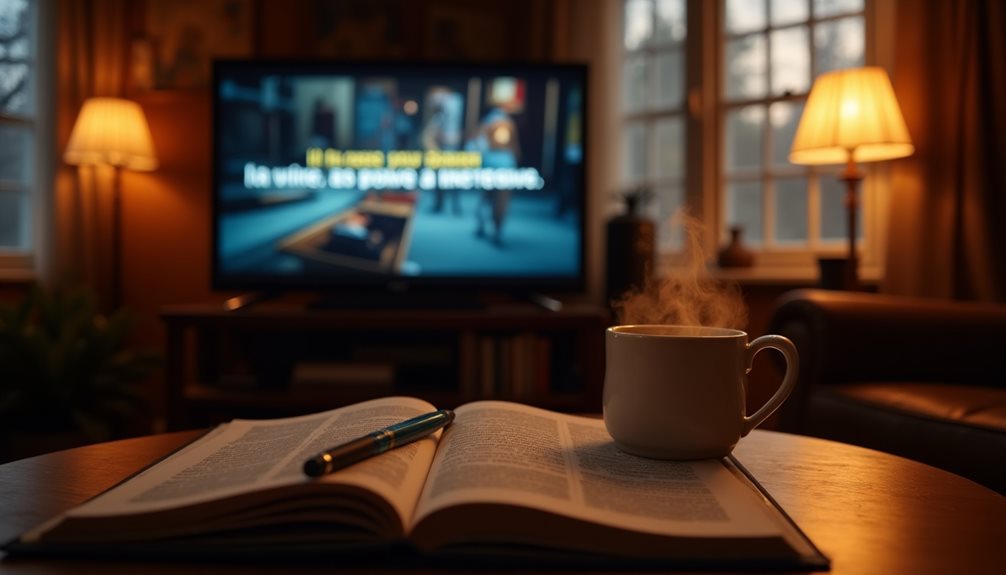Table of Contents
ToggleBenefits of Using Films for Language Learning

Numerous advantages emerge when learners incorporate films into their language acquisition process, particularly for a complex language like Russian.
Films serve as powerful motivational techniques, engaging learners emotionally and culturally, which fosters a deeper desire to master the language.
This immersive method liberates individuals from traditional, rigid study structures, allowing them to explore linguistic nuances freely through dynamic storytelling.
Moreover, the cognitive advantages are significant.
Films enhance auditory comprehension and vocabulary retention by presenting language in context, reinforcing grammatical structures and idiomatic expressions naturally.
Visual cues paired with dialogue aid memory encoding, optimizing neural pathways for language processing.
For those seeking autonomy in learning, films offer a strategic tool to break free from conventional constraints, accelerating proficiency with precision.
Using films as a tool to learn Russian offers a dynamic and engaging way to improve language skills. Beyond textbooks and drills, movies bring the language to life, showing how native speakers use it naturally in everyday situations and emotional contexts. This makes films a uniquely effective resource for learners at all levels.
Learning Russian can be challenging. It has a different alphabet (Cyrillic), complex grammar, and many expressions that don’t translate directly into English. Using films as part of your study routine can make this easier and more enjoyable. Here’s why films are a great tool for learning Russian and some tips and examples to help you make the most of them.
![]()
Why Films Are So Helpful for Learning Russian
1. Motivation and Cultural Connection
Movies show Russian culture, history, humor, and emotions. This makes learning feel real and exciting. When you understand what happens in a story or relate to characters, you want to keep learning to follow along better.
2. Natural Language Use
Films use everyday language, slang, idioms, and different speech styles (formal, informal, polite, rude). This is how Russians really speak — not just textbook examples.
Example:
- The phrase “Как дела?” (Kak dela? / How are you?) is common in movies and daily life.
- You might also hear “Что нового?” (Chto novogo? / What’s new?), which is a casual way to ask about news or life updates.
3. Listening Practice in Context
Hearing words in sentences helps you understand their meaning better than memorizing isolated words. You also learn the natural rhythm, intonation, and pronunciation of Russian.
4. Visual Clues Improve Memory
Seeing actions, facial expressions, and settings while hearing words helps your brain connect meaning to sounds. This makes it easier to remember vocabulary and grammar.
5. Flexible, Self-Paced Learning
You can pause, rewind, or re-watch scenes. You can choose movies at your level — from simple cartoons to complex dramas.
![]()
Tips for Using Films Effectively to Learn Russian
- Start with subtitles: Use Russian subtitles if possible, so you see the words as you hear them. If you’re a beginner, use English subtitles first, then switch to Russian.
- Repeat key scenes: Watch important or interesting scenes several times to catch new words and phrases.
- Write down new words: Keep a notebook or app with new terms and their meanings.
- Practice speaking: Repeat sentences out loud to improve your pronunciation.
- Mix genres: Try comedies, dramas, cartoons, or documentaries to hear different styles of language.
Russian Terms Related to Films and Language Learning
| Cyrillic | English Phonetic | English Definition |
|---|---|---|
| фильм | film | film, movie |
| субтитры | subtitry | subtitles |
| диалог | dialog | dialogue |
| актёр / актриса | aktyor / aktrisa | actor / actress |
| сюжет | syuzhet | plot |
| реплика | replika | line (spoken by a character) |
| произношение | proiznosheniye | pronunciation |
| грамматика | grammatika | grammar |
| словарный запас | slovarnyy zapas | vocabulary |
| слушать | slushat’ | to listen |
| повторять | povtoryat’ | to repeat |
| учить язык | uchit’ yazyk | to learn a language |
| смотреть фильм | smotret’ film | to watch a movie |
![]()
Using films as a language learning tool brings Russian to life in a way that books alone can’t. It connects you with the real language people use every day and makes your study experience richer and more fun.
Top Russian Movies to Start With
A carefully curated selection of Russian films can serve as an effective entry point for language learners seeking to immerse themselves in authentic linguistic and cultural contexts.
For those yearning for intellectual freedom, exploring both Soviet Cinema and Contemporary Hits offers a window into Russia’s evolving narrative and linguistic diversity.
To guide this journey, consider these meticulously chosen films for their cultural depth and language exposure:
- *Ivan’s Childhood* (1962) – A poignant Soviet Cinema classic.
- *Battleship Potemkin* (1925) – Iconic silent film from Soviet Cinema.
- *Leviathan* (2014) – A stark Contemporary Hit on corruption.
- *Night Watch* (2004) – A thrilling Contemporary Hit in fantasy.
- *Brother* (1997) – A gritty post-Soviet crime drama.
These selections provide a robust foundation for linguistic and cultural exploration.
Tips for Maximizing Your Learning Experience
While beginning on the journey of learning Russian through films, language learners can greatly enhance their progress by adopting structured strategies. By leveraging systematic approaches like Flashcard Techniques, individuals can reinforce vocabulary and phrases encountered in movies, ensuring retention through active recall. Equally critical are Motivation Strategies, which empower learners to maintain consistency by setting personal goals and celebrating milestones, fostering a sense of autonomy.
To optimize learning, consider this structured breakdown:
| Technique | Application | Benefit |
|---|---|---|
| Flashcard Techniques | Review dialogue snippets | Boosts memory retention |
| Motivation Strategies | Set weekly viewing goals | Sustains learning drive |
| Subtitle Toggle | Alternate Russian/English | Improves comprehension |
| Repetition Viewing | Re-watch key scenes | Reinforces pronunciation |
| Note-Taking | Jot down new phrases | Enhances active engagement |
These methods liberate learners to master Russian efficiently.
Understanding Cultural Context Through Cinema
Observers of Russian cinema will find that films offer a profound window into the societal norms, historical events, and cultural intricacies of the nation.
By analyzing these works, one uncovers layers of meaning embedded in Cultural Symbols and Historical Depictions, reflecting Russia’s complex identity.
This cinematic exploration liberates viewers from surface-level understanding, granting deeper insight into a society’s soul.
Key elements to examine include:
- Visual motifs representing Cultural Symbols like the matryoshka doll.
- Historical Depictions of pivotal events such as the Soviet era.
- Portrayals of traditional values versus modern shifts.
- Settings that mirror societal struggles or triumphs.
- Character archetypes embodying national resilience.
Through such analysis, cinema becomes a tool for intellectual freedom, revealing truths about Russia’s past and present.
Building Vocabulary and Listening Skills With Films
Enthusiasts of language acquisition can harness Russian films as a dynamic resource for enhancing vocabulary and refining listening skills.
Through meticulous film analysis, learners can dissect dialogues to uncover nuanced expressions and idiomatic phrases, breaking free from rote memorization.
This method empowers individuals to absorb authentic language patterns in context, fostering independent mastery.
Additionally, script adaptation offers a technical approach to learning.
By comparing original Russian scripts with subtitles, one can identify linguistic structures and expand lexical range with precision.
Listening to varied accents and intonations in films sharpens auditory discrimination, equipping learners with the tools to navigate real-world conversations.
This liberated, analytical strategy transforms passive viewing into an active, skill-building exercise, unleashing the full potential of cinematic immersion.



